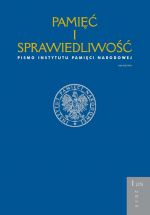Droga do Norymbergi. Geneza sądowych rozliczeń ze zbrodniami III Rzeszy.
The Road to Nuremberg. The Genesis of Judiciary Settling Accounts with Crimes of the Third Reich.
Author(s): Paweł MachcewiczSubject(s): Politics / Political Sciences, History, Law, Constitution, Jurisprudence, Political Theory, Recent History (1900 till today), WW II and following years (1940 - 1949)
Published by: Instytut Pamięci Narodowej
Keywords: crimes; Third Reich; Allies; trials; Nuremberg; International Military Tribunal
Summary/Abstract: The first reported court trials for war crimes concerned offenses committed during theAmerican Civil War (1861–1865). After World War I, the victorious nations of the Ententeattempted to put the former German Emperor Wilhelm II and other German military leadersresponsible for particularly drastic crimes. The former ruler took refuge in the Netherlands,which refused to extradite him, and the Reich Tribunal in Leipzig held a numberof trials under heavy pressure from the victorious coalition. The majority of them led toacquittals or exceptionally short sentences, which resulted in the Leipzig process being labelleda travesty of justice; during World War II the allies regarded it as a negative experiencewhich they should avoid repeating at all costs. During the period 1919–1920 severaldozen trials concerning the slaughter of Armenians were held in Turkey by Turkish andBritish authorities, but they were equally inadequate for the scale of the crimes committedinvolving the murder of almost a million people. The anti-Hitler coalition thus couldnot draw on any real examples from the past when seeking to account for the crimes of theThird Reich and its allies, nor were there any international legal regulations or institutionalsolutions that they could look to. The first action taken to document the crimes committedin occupied countries were undertaken by governments-in-exile in London, primarilythat of the Republic of Poland. It was pressure from that as well as other governments aswell as others which led to the formation of the War Crimes Commission in October 1943,which developed a new legal concept and category: crimes against humanity. It turnedout to be key in enforcing liability for crimes against civilians; it was invoked during theNuremberg trials, and is also applied in many contemporary criminal proceedings. Thefirst joint Allied commitment to prosecuting war crimes was the Moscow Declaration of1 November 1943, but even after its adoption there were serious disagreements among theallies as to how this should be done. Winston Churchill, the Prime Minister of the UnitedKingdom, was opposed to the creation of an international tribunal, citing the differentlegal systems of the Allies and the fiasco of the Leipzig trials following World War I; hewas a supporter of summarily executing the leaders of the Third Reich and fascist Italy.The legal framework of the post-war trials was only developed during the closing monthsof the war, with American politicians and lawyers playing a key role. Their contributionwas to base the most important post-war trials on three pillars: the categories of crimesagainst humanity, crimes against peace and the charge of conspiracy to commit crimes(a direct transplant from the American legal system). The trials held before the InternationalMilitary Tribunal, held in Nuremberg from 20 November to 1 October 1946, werean attempt, unprecedented in the history of civilization, by the international communityto bring to justice the leaders of a defeated state to justice for their crimes. In spite of thenumerous criticism levelled against various aspects of the Nuremberg trials, it ultimatelybecame a point of reference and an example for later attempts at placing political andmilitary leaders on trial for their crimes.
Journal: Pamięć i Sprawiedliwość.
- Issue Year: 25/2015
- Issue No: 1
- Page Range: 79-111
- Page Count: 32
- Language: Polish

